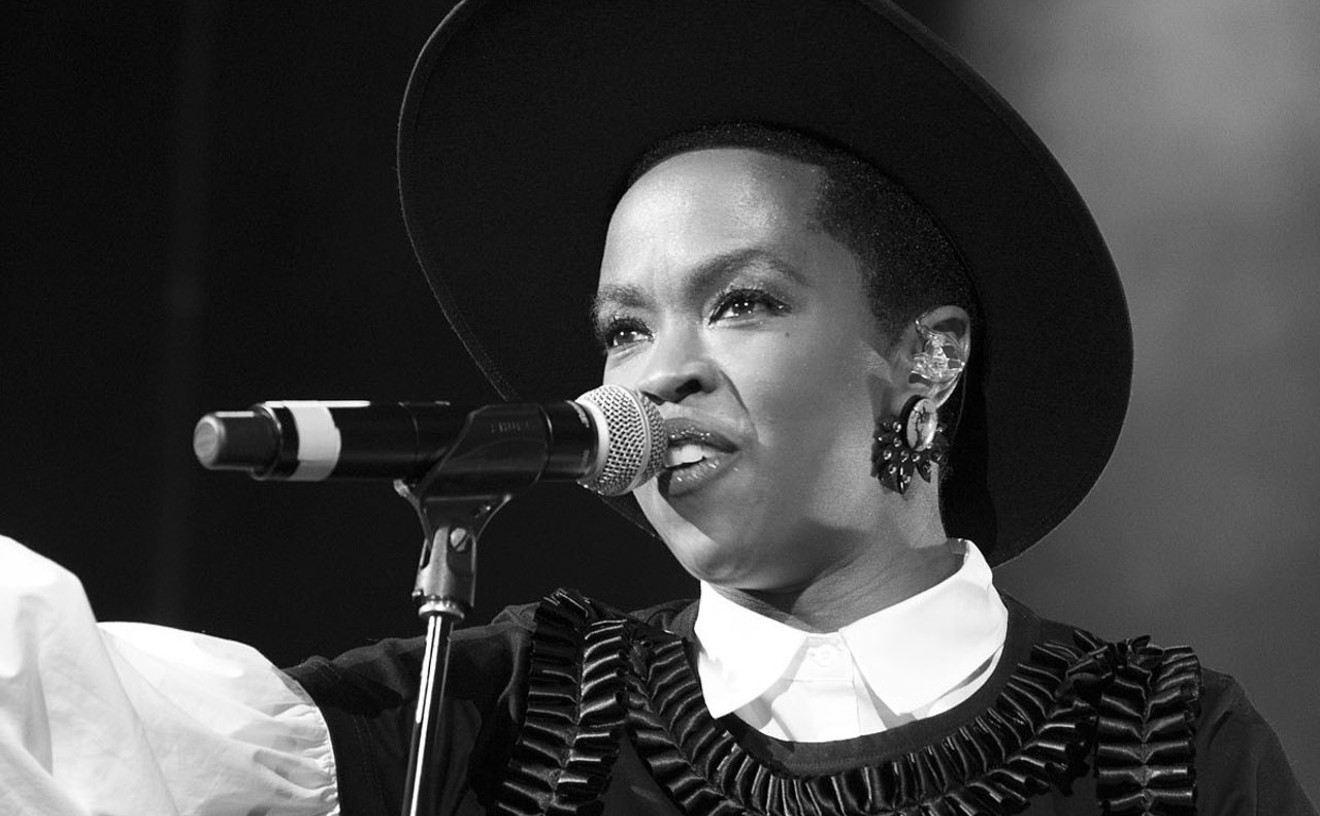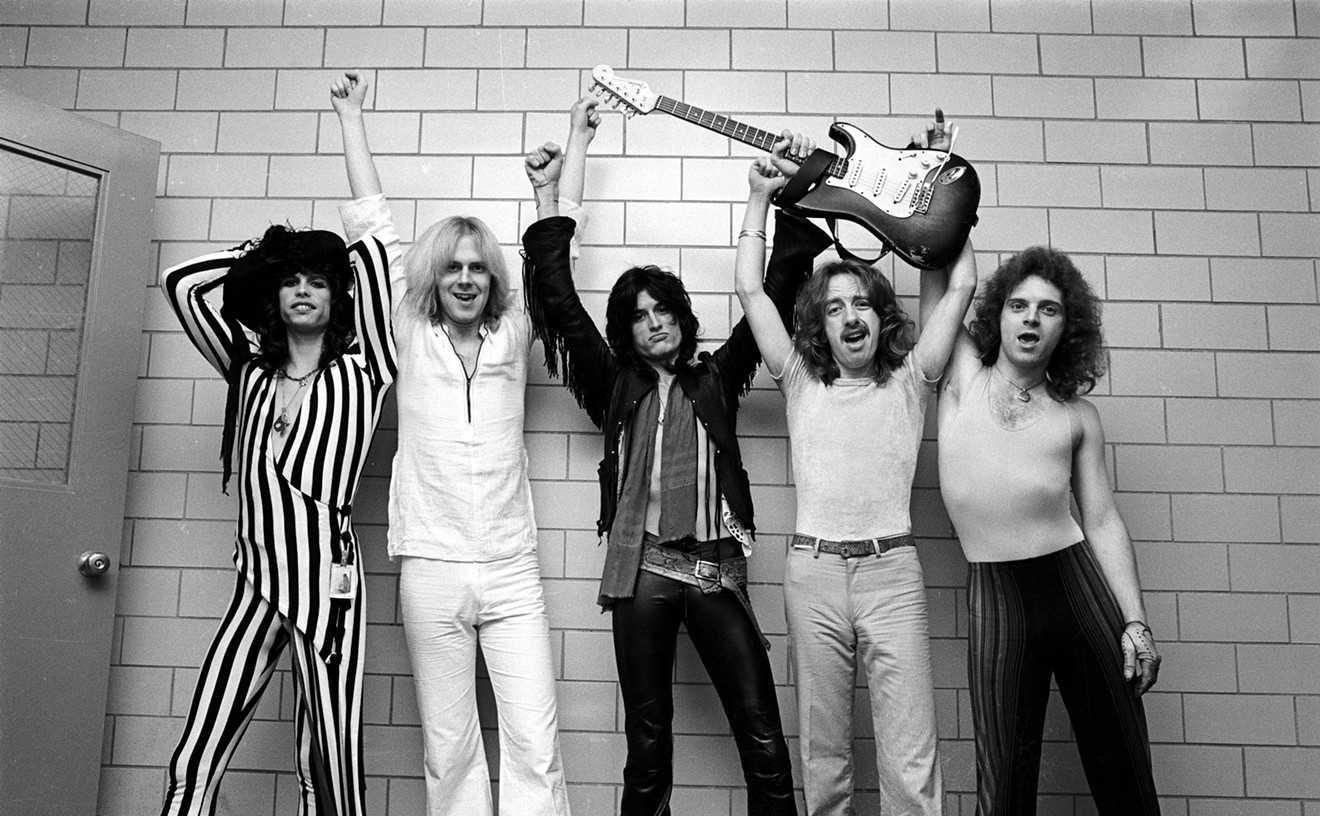Of course, Lawrence didn't know at the time that Sticks and Stones would quickly spawn four juicy hits, each scaling the charts with a bullet.
This night, the only bullets that were on his mind were those in the chamber and clip of the .38 special that was suddenly pressed against the back of his head.
"There were three of them," Lawrence recalls during a telephone conversation from Dallas, where he was preparing to play to a packed house at Cowboys, a popular Big D dance palace. "Two of them had guns. They took our money--about $500--credit cards, and the keys to Sonja's Corvette. I kept thinking about what people always say: 'Just give them what they want; don't resist.'"
When the thugs didn't immediately take their loot and drive off in his friend's Sting Ray, Lawrence knew that such traditional advice wouldn't suffice.
"When the one with the gun at my head asked, 'What room are you in?', I just went cold," Lawrence says quietly. "They weren't trying to cover up their faces or anything, and the way they were looking at her was frightening. I was sure they were going to rape her and probably kill us both."
Two of the bandits began marching Wilkinson toward the hotel, while Lawrence and the third man--still pushing the pistol against Lawrence's head--followed a dozen or so yards behind.
"I can't say that I was frightened," Lawrence says without a trace of bravado. "I kept thinking, 'Man, this isn't really happening. This is somebody else, not me.'" As they drew nearer to the darkened hotel, however, reality hit him hard.
"I just decided that they would have to kill me here," he says. "I'd die fighting."
He whirled around and grabbed his assailant's pistol--getting his finger shot in the process. The two men with Wilkinson were distracted; Lawrence shouted for Wilkinson to run. She did. As Lawrence grappled with the gunman, one of the other men fired at him, striking him in the hip. Lawrence tried to flee. A shot grazed his arm, while another bullet hit him in the back of his knee, felling him. He lay helpless as the men emptied their guns at him before taking off into the night.
"The bullets were pinging off the pavement all around my head," Lawrence remembers. "I was sure I was going to die. Thank God, they were pretty bad shots."
At Nashville's Vanderbilt Hospital, surgeons removed the bullet from Lawrence's knee, but chose to leave the one lodged in his hip.
"The doctors told me that the bullet in the hip had missed a main artery by a tenth of a millimeter," Lawrence says. "They said that if it had hit the artery, I'd have bled to death in three minutes."
Having survived--and recovered--from this harrowing ordeal, Lawrence is understandably one thankful Arkansan. Not only has Sticks and Stones gone precious metal, but the first three singles--the title track, "Today's Lonely Fool" and "Runnin' Behind--all shot to the top of the country charts. The fourth, the clever ballad "Somebody Paints the Wall," (Seems like every time I make a mark . . .), went into this past holiday season at Number Six--with a bullet.
Had his parents had their way, however, Tracy Lawrence might never have found out about the bright lights--and muzzle flashes--of the big city. He'd moved with his mother, stepfather and five siblings from hometown Atlanta, Texas, to Foreman, Arkansas, when he was 4. His was a very religious upbringing: "Mama wanted me to be a preacher."
"My folks are typical Southern Democrat Methodists who didn't encourage my guitar playing," Lawrence laughs. "It wasn't the instrument itself; it was where I played it. By the time I was 17, I was in bands playing in honky-tonks. They didn't like that much, and they couldn't see how I had a shot at doing anything but wasting my life away. Add to that my rotten rebel ways. I just kept getting caught--and they were concerned for my future. But, I got away with a lot because I always made it to church. As long as I was in church on Sunday morning, Mama was happy and forgiving."
In an effort to please his parents, Lawrence spent a couple of years at Southern Arkansas University in Magnolia before dropping out. Then he tried the workaday world.
"I thought maybe my folks were right," he says. "I got a job working at a paper mill and I played in local clubs a few nights a week. I got a nice apartment, and I was seriously thinking about marrying this girl. I even bought a ring.
"Then I got laid off from the mill and, at the very same time, lost the gigs at night. Suddenly I was getting $56 a week from unemployment and staying at one of those fleabag motels. Things were about as bad as they could be, but I wasn't going to go home to the folks. I didn't want to spend the rest of my life in Foreman, Arkansas."
Instead, Lawrence joined a Louisiana band as its lead singer. That went well for two years until the bassist--who owned most of the band's sound equipment--decided to quit. Still, the steady work wrought a renewed determination. Lawrence decided to move to Tennessee.
"I had this ancient Toyota Corolla that I kept together with duct tape and baling wire," he chuckles. "I didn't even have any insurance. I sold everything that wouldn't fit in it and loaded up the rest. I was very scared. I only had about $700, and I didn't know a soul in Nashville. As I backed out of my folks' driveway, I told Mama not to worry.
"Son,' she said, 'It's not you I'm worried about--it's all those other people.'"
Lawrence hit Music City in September 1990. He frequented all the area's talent contests, using his winnings--$75 here, $100 there--to survive. He also got a regular, if not well-paying, gig on Live at Libby's, a Daysville, Kentucky, radio show heard in four states. A couple of times each week, he'd make the 150-mile round trip to sing a few songs. The $25 he received went mostly for gas. His resonant, deep-fried country vocals, however, did catch the ears of some veteran Nashville cats--including drummer Terry Buttram, who befriended Lawrence and showed him around town, as well as future managers Jeff Carver, Wayne Edwards and Mike Nunn.
Thanks to these Music Row regulars, Lawrence got a late January 1991 showcase at the Bluebird Cafe, the famed Nashville insiders' listening post. Soon afterward, he cut a demo and, with the help of his new managers, shopped it around. One tape managed to get into the hands of Rick Blackburn, president of Atlantic Records' Nashville division. Blackburn liked what he heard, and signed Lawrence--a mere eight months after the 24-year-old fled Foreman, Arkansas.
When he first met Lawrence, Blackburn liked what he saw, too. Even before releasing a single song, the label was able to garner the slender, blond and dimpled six-footer a whole passel of endorsement contracts for cowboy-type stuff--boots, jeans, hats.
Lawrence says he appreciates the attention--and, naturally, the income--his fledgling modeling sideline provides, but, he says, "It's the music that matters, man." Although he counts George Strait, Merle Haggard and George Jones as influences--he'll begin a tour with the Possum later this winter--he is particularly proud of frequent (and deserved) vocal comparisons with the late Keith Whitley--who lost his battle with alcohol a few years ago.
"I can't think of a greater compliment," Lawrence asserts. "I listen to him religiously." He pauses. "Had Keith Whitley lived, he'd be bigger than Garth."
Presently, Tracy Lawrence is finishing work on his second--as yet untitled--album. A first single and video, "Alibis," is due out in late January with the full recording soon to follow.
He's fully recovered from his wounds, too--confounding doctors who predicted a six-month recuperative period; he walked limplessly after only five weeks. Lawrence doesn't fret about the mean streets, opting instead to concentrate on the future. In fact, he reserves any such concern for childhood pal Sonja Wilkinson--to whom he has dedicated Sticks and Stones. Wilkinson continues to battle emotional problems wrought by that near tragedy in Nashville.
"She'd made it safely to the hotel's lobby," Lawrence says, "but she heard all of the shots. She stood there not knowing if I was dead or alive.
"But it wasn't my time to go," Tracy Lawrence says softly. "And I get to sing some more. I'm a lucky man, aren't










